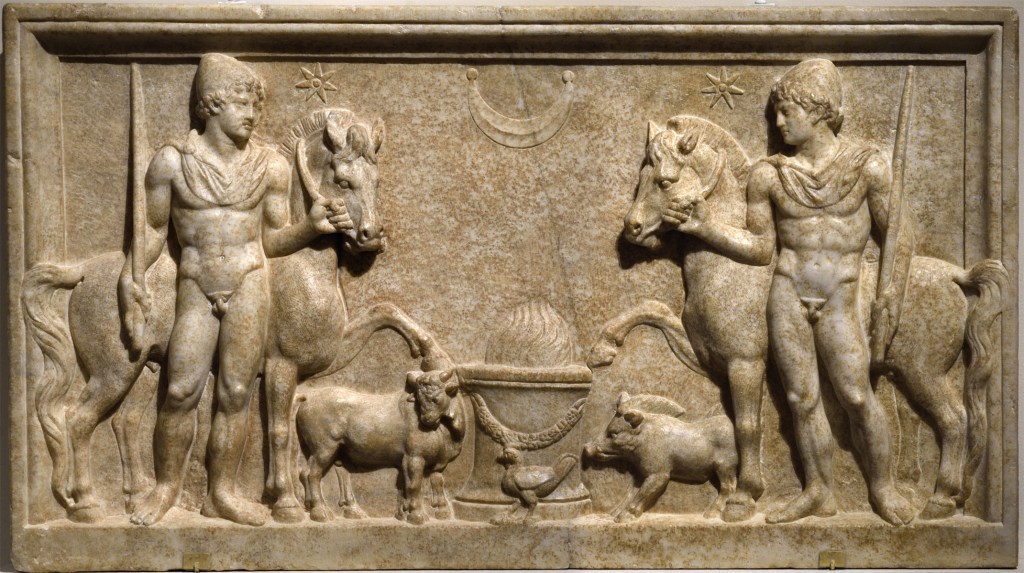
I found this rather amusing. Per Cicero, there is a tale of the Greek poet Simonides having a near-death experience. Or, we should say – a Near Dioscuri experience !
Simonides had been commissioned to eulogize the sporting victory of Scopas at a banquet held by the latter. In the course of doing so, the pious Simonides included a significant swathe of referential material to the Dioscuri – the Indo-European Horse Twins, Castor & Pollux.
Now, some men might take it as an honour that their deeds provided ample stage to also discuss those of the Divine – but not Scopas. Unsatisfied with not being the entire focus and center of attention for the full span of the poem, he brusquely told Simonides that as he’d only been the focus for half the poem he would only be paying Simonides half of the agreed upon fee.
And that should Simonides wish to collect the other half, he should take it up with the other beneficiaries of his verses – namely, Castor & Pollux Themselves. Preferably in person – which, given the situation of at least one of the Hero-Twins, was an implicit instruction to, as the more modern idiom would have it .. “Go to Hell”.
Later on during the evening, however, it was reported that there had been a knock at Scopas’ door – and two young men had arrived asking to speak to Simonides.
So Simonides got up from the banquet and went out to meet these two young fellows who had asked for him by name … and was further dismayed to see that there was now nobody there awaiting him. He presumed that this must be some prank and additional prodding from the irritated Scopas.
He was just about to turn around and go back to the feast … when the palace of Scopas collapsed behind him, killing everybody who had been inside, and leaving Simonides the lone survivor.
The implication is quite clear: the two young men were, in fact, the Dioscuri Themselves – evidently rather pleased with Simonides’ favourable remarks and integration of Their deeds and reputation into his verses for Scopas and the former’s generally mindful piety upon the matter. And, further, rather displeased at the disrespect meted out by Simonides’ ill-tempered patron, Scopas.
They had thus turned up in person to bestow a boon – that of not being crushed to death by falling masonry. So, in a way, Scopas’ vitriolic remark that Simonides should have to collect the other half of his payment for his verses from those other figures Whom Simonides had eulogized, preferably in person .. had indeed come to fruition.
It is occasionally said that the Hindu understanding of these figures – the Asvins [‘Horse [Twins]’ – although ‘Equestrians’, ‘Cavaliers’ is perhaps a slightly closer translation] – have a bit of a ‘prankster’ streak, and are certainly renowned for possessing an interesting sense of humour. Personally, I would note that various of the occurrences we might label as “pranks” are acts of ‘rebalancing’ undertaken with deliberate intent and just cause in mind; although this does not stop there from being outrage in Their wake.
Both the Asvins and the Germanic understanding of these figures – Hengist and Horsa [‘Stallion’ and ‘Horse’, respectively] are also renowned for helping people (with Hengist & Horsa interestingly also making use of sudden lethality at large-scale feasting as a problem-solving tool, per Nennius’ History of the Britons); indeed, it is quite directly there in the Proto-Indo-European etymology of “Nasatyas” [occasionally translated as ‘Saviors’ – another way to refer to the Asvins – also attested in the Mitanni Treaty seals; and via the demon-lists of the Zoroastrians] – PIE ‘Nes’, referring to a refuge, getting home (particularly getting home safely), and to healing (being restored to the proper, uninjured state).
As we can see here, therefore, the story of Simonides thusly features not merely an ‘encounter’ with the Dioscuri Horse-Twins … but the Horse Twins carrying out exactly Their mythic role and aiding Simonides, protecting him from peril and assisting in the striking down of those who would demean the Faith or proffer harm towards the properly pious man.
There’s another lesson here too, of course – and it is one that also has some archaic Vedic saliency:
ALWAYS PAY YOUR POET !
Pingback: brief notes on ‘eternal return’ – in answer to questions from a reader [Arya Akasha Arka] | arya-akasha